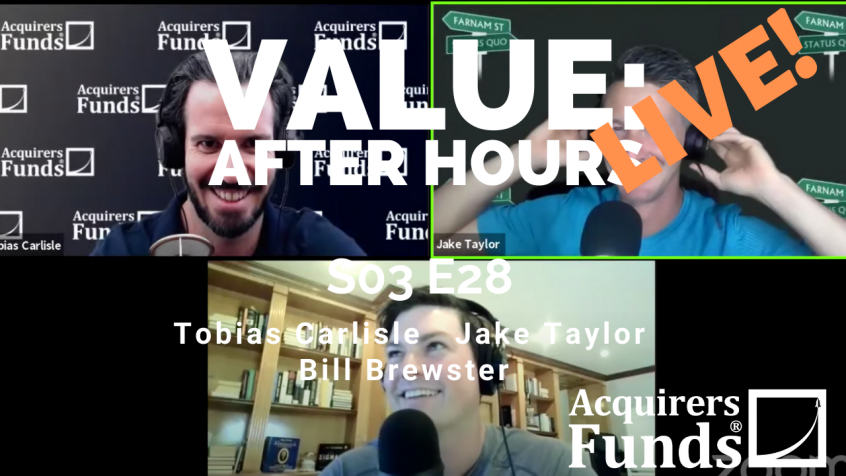In their recent episode of the VALUE: After Hours Podcast, Taylor, Brewster, and Carlisle discussed The El Farol Bar Problem. Here’s an excerpt from the episode:
Jake: This is the kind of famous at this point, El Farol problem. E-L-F-A-R-O-L. If in case, you want to look it up yourself and actually learn about it as opposed to my version of it. But El Farol is this bar that is in Santa Fe, and it used to feature Irish music on Thursday nights. There’s this economic professor at the Santa Fe Institute, his name is Brian Arthur. By the way, if you had a time machine, and you could force yourself to go back to, I think it was 1998 when he wrote this paper on increasing returns of scale. If you could have gone back and read that and said like, “Listen, this one’s important. Forget all this other stuff. Read this. Make sure you read it.” Like you were Biff with the sports almanac?
Tobias: [laughs]
Jake: That would have been a very, very lucrative idea for you to have internalized in 1998. Anyway, so, Brian Arthur, he wrote that paper. He’s from Belfast originally, and he likes going to hear this Irish music of his youth at El Farol, this bar. However, he doesn’t like going when there’s a bunch of drunk lunatics at the bar, and it’s too crowded.
Suppose 60 people are considering going, but none of them want to go if more than 60 people are going to be at the bar, because it’s an unpleasant experience then. But less than 60, it’s quite pleasant. We pretend that over the past 10 weeks, here are the number of people who have gone. 15, 18, 83, 66, 45, 76, 67, 56, 88, 37. So, we have five good nights and five bad nights over the last 10 weeks when you two have gone to go see this Irish music.
Well, now, these 100 people who are deciding, “Should I go to the bar or not on Thursday evening?”, they all have their own model of what might be the right reason for them to go or not. Maybe, some people would use just last week’s and say like, “Oh, well, it’s 37 last week. Therefore, it’s likely to be below 60 this week. I’m going to go.” Now, what if some people said, “Well, I’m going to take the average of those last 10 weeks which happens to be 55,” and they decide, “Well, I’m going to go. That’s below 60.” Or, maybe there’s some people who maybe take the average of the last four weeks, which would have been 62, and they decided, “Well, I’m not going to go.”
Well, there are different methods of prediction end up in this ecology of prediction. All of these prediction models are competing with each other for accuracy. Some of the models will live and some of them will die based on how accurate they are. People, they’re evolving their models with new data to try to figure out what’s the right thing to do.
The thing is if they all shared the same rational model, what would end up happening? It would end up negating itself, because everyone would end up predicting that few people would go, and they would go, and that would be wrong. Or, they’d all be predicting that too many people are going and no one would go, and then, it actually would have been a good time to go. They have a way of canceling themselves out. Each model is affected by the prediction of other people’s models. Really, you end up with chaos in this complex adaptive system.
This happens to basically describe how the market works as well. People have their predictive models, and everyone’s competing against each other with their models, and there’s an ecology of models out there competing with each other to try to figure out, “Is this a good time to go to the bar or not, right? Is this a good time to buy or not?”
Actually, Merrill Lynch did this study for a long time, and then they got acquired by BofA. The last publication of it I could find was from 2019. But what they did was, they survey institutional investors to see what factors are they using basically, like, what model are you using to decide whether you want to go to the bar or not?
You can find out more about the VALUE: After Hours Podcast here – VALUE: After Hours Podcast. You can also listen to the podcast on your favorite podcast platforms here:
For all the latest news and podcasts, join our free newsletter here.
Don’t forget to check out our FREE Large Cap 1000 – Stock Screener, here at The Acquirer’s Multiple:



